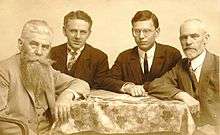Occidental language
| Occidental | |
|---|---|
| Interlingue | |
 | |
| Created by | Edgar de Wahl (1922) |
| Setting and usage | International auxiliary language |
| Purpose | |
| Language codes | |
| ISO 639-1 |
ie |
| ISO 639-2 |
ile |
| ISO 639-3 |
ile |
Linguist list |
ile |
| Glottolog |
Noneocci1241 (retired)[1] |
The language Occidental, later Interlingue, is a planned international auxiliary language created by the Balto-German naval officer and teacher Edgar de Wahl, and published in 1922. The vocabulary is based on already existing words from various languages. The language is thereby naturalistic, at the same time as it is constructed to be regular.[2] Occidental was quite popular in the years before the Second World War, but declined in the years thereafter.
Occidental is devised so that many of its derived word forms reflect the similar forms common to a number of Western European languages, primarily those in the Romance family. This was done through application of de Wahl's rule which is a set of rules for converting verb infinitives into derived nouns and adjectives. The result is a language easy to understand at first sight for individuals acquainted with several Western European languages. Coupled with a simplified grammar, this made Occidental exceptionally popular in Europe during the 15 years before World War II.

In The Esperanto Book, Don Harlow says that Occidental had an intentional emphasis on European forms, and that some of its leading followers espoused a Eurocentric philosophy,[3] which may have hindered its spread. Still, Occidental gained adherents in many nations including Asian nations. According to the Occidental magazine Cosmoglotta in 1928, a majority of Ido adherents took up Occidental in place of Ido.[4]
Occidental survived World War II, undergoing a name change to Interlingue, but faded into insignificance following the appearance in the early 1950s of a competing naturalistic project, Interlingua,[5] which attracted among others the notable Occidentalist Ric Berger.[6]
Alphabet and pronunciation
Occidental is written with 26 Latin letters: a, b, c, d, e, f, g, h, i, j, k, l, m, n, o, p, q, r, s, t, u, v, w, x, y, z. The letters of the alphabet are pronounced as a, be, ce, de, e, ef, ge, ha, i, jot, ka, el, em, en, o, pe, qu, er, es, te, u, ve, duplic ve, ix, ypsilon, and zet.[7]
Pronunciation
The vowels a, e, i, o, and u have a continental pronunciation and are all sounded. The y (initial and medial) are pronounced as in "yes", ey (final) as in "they", and eu as éh-oo.[8]
The consonants are pronounced as in English, with the following exceptions:[8]
- c when before e and i = ts: cive = tseevay, helice = heleetsay and
- g when before e and i = French j or English s in pleasure: plage, giraffe; but elsewhere c and g are hard as in can, go.
- ss as in pass
- s between vowels = z: rose, positiv
- z = ds
- ch = English sh: chambre
- j = ?
Grammar
Like English, Interlingue has a definite article and an indefinite article. The definite article (the) is li, and the indefinite (a, an) is un. Plural of a noun is made by adding -s after a vowel, or -es after a consonant.[8]
Personal pronouns
Interlingue has two forms for the personal pronouns: one for the subject form (nominative), and one for the object form (accusative or dative). In short, the personal pronouns in the subject form are:
| Singular | Plural | |||||||
|---|---|---|---|---|---|---|---|---|
| first | second | third | first | second | third | |||
| English | I | you | he | she | it | we | you | they |
| Occidental | yo | tu | il | illa/ella | it | noi | vu | ili |
The variants illa and ella both exist for third person singular feminine.[9] The pronoun expressing politeness is vu,[7] which behaves like second person plural. The indefinite personal pronoun "one" is on in Occidental.[8] If necessary, one can specify the gender of third person plural by using illos (masculine) or illas (feminine).[7]
In the object form the pronouns are: me, te, le, la, it, nos, vos, and les (with los and las as specific masculine and feminine forms, respectively). The possessive pronouns are mi, tui, su (his/her/its), nor, vor and lor.[7]
Example texts
Li material civilisation, li scientie, e mem li arte unifica se plu e plu. Li cultivat europano senti se quasi in hem in omni landes queles have europan civilisation, it es, plu e plu, in li tot munde. Hodie presc omni states guerrea per li sam armes. Sin cessa li medies de intercommunication ameliora se, e in consecuentie de to li terra sembla diminuer se. Un Parisano es nu plu proxim a un angleso o a un germano quam il esset ante cent annus a un paisano frances.
Translation: "Material civilization, science, and even art unify themselves more and more. The educated European feels himself almost at home in all lands that have European civilization, that is, more and more, in the entire world. Today almost all states war with the same armaments. Without pause the modes of intercommunication improve, and in consequence from that the world seems to decrease. A Parisian is now closer to an Englishman or a German than he was a hundred years before to a French peasant."
| The Lord's Prayer in Occidental | Interlingua version | Latin version (traditional) | English version (traditional) |
|
Patre nor, qui es in li cieles, |
Patre nostre, qui es in le celos, |
Pater noster, qui es in cælis, |
Our father, who art in heaven, |
See also
References
- ↑ Hammarström, Harald; Forkel, Robert; Haspelmath, Martin; Bank, Sebastian, eds. (2016). "retired". Glottolog 2.7. Jena: Max Planck Institute for the Science of Human History.
- ↑ Curs de Occidental in Occidental, read 18 November 2013.
- ↑ Harlow, Don. The Esperanto Book, Chapter 3: "How to Build a Language".
- ↑ Cosmoglotta, October 1928, Num. 53(10), p. 142, 149-152, Ido-Congress in Zürich.
- ↑ Language, p. 73, at Google Books
- ↑ Interlingua Institute: A History, p. 21, at Google Books
- 1 2 3 4 Grammatica de Interlingue in English, F. Haas 1956. Read 31 October 2013.
- 1 2 3 4 The Basis of International language. Read 1 November 2013.
- ↑ H. Jacob on Occidental (1947). Read 3 November 2013.
External links
| Interlingue edition of Wikipedia, the free encyclopedia |
- The Official Website of the Interlingue-Union
- Wiki site with a collection of texts
- interlingue.narod.ru, information and word lists (vocabularium) in English and Russian.
Grammar and Dictionary
- Grammar of Interlingue in English by Dr. F Haas
- Radicarium directiv del Lingue International (Occidental) in 8 lingues by Edgar von Wahl
- An English-Interlingue Dictionary by Kemp and Pope, also available as a text file.
- Resume de gramatica de Interlingue (Occidental) in Interlingue (e demonstration de leibilita!).
Texts
- A Collection of Old Texts in Interlingue
- Cosmoglotta Biblioteca- Preservation of Occidental texts. (Free registration required.)
- A wiki with Occidental info. Auli-Occidental Wiki
- William Patterson's Occidental Pages – Including the classic text Ex li paper-corb by Farfarello, from Cosmoglotta #118, November/December 1937.